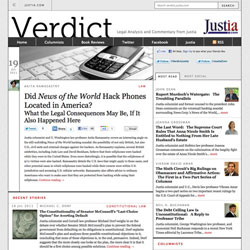![]() Pinterest filed a complaint at the end of August in the Northern District of California against Qian Jin of Nanjing, China, for cyberpiracy, trademark infringement and false designation of origin, trademark dilution, and unfair competition. Specifically, Pinterest claims that Qian purchased dozens of “infringing” domain names that are nearly identical and confusingly similar to pinterest.com, and uses them purely for online advertisements. Pinterest also alleges that Qian applied to register PINTEREST and PINTERESTS as trademarks in the United States in bad faith, stating that he had full knowledge of Pinterest’s brand and services.
Pinterest filed a complaint at the end of August in the Northern District of California against Qian Jin of Nanjing, China, for cyberpiracy, trademark infringement and false designation of origin, trademark dilution, and unfair competition. Specifically, Pinterest claims that Qian purchased dozens of “infringing” domain names that are nearly identical and confusingly similar to pinterest.com, and uses them purely for online advertisements. Pinterest also alleges that Qian applied to register PINTEREST and PINTERESTS as trademarks in the United States in bad faith, stating that he had full knowledge of Pinterest’s brand and services.
Articles Posted in Social Media
 Sure, California may be facing a $15.7 billion deficit, but the Facebook IPO has Sacramento singing, “Goodbye grey sky, hello blue.”
Sure, California may be facing a $15.7 billion deficit, but the Facebook IPO has Sacramento singing, “Goodbye grey sky, hello blue.”
State senator Michael J. Rubio already has plans on how to spend the expected bump to the state’s coffers.
Today, Facebook, Inc. filed a Form S-1 Registration Statement [PDF] with the U.S. Securities and Exchange Commission in preparation for its initial public offering. Here are some observations from reading this interesting filing.
Billion with a B. Companies that manufacture and sell tangible products are easy to understand. For a company like Facebook, you may be scratching your head wondering if they are making any money at all. In 2011, Facebook reported $1 billion in net income from $3.7 billion in revenue.
 Here is a rundown of January’s highest scoring lawyers on Justia Legal Answers, along with a look at which Justia Dockets legal filings and Facebook posts readers viewed the most.
Here is a rundown of January’s highest scoring lawyers on Justia Legal Answers, along with a look at which Justia Dockets legal filings and Facebook posts readers viewed the most.
Justia Legal Answers’ Top 10 Legal Answerers for January 2012
- Jeffrey Moore, 3050 points, 61 answers
- Brian D. Lerner, 1,395 points, 33 answers
- Andrew Bresalier, 1,100 points, 36 answers
- David Philip Shapiro 980 points, 20 answers
- Don Richardson, 360 points, 8 answers
- Paula Jeanette McGill, 350 points, 7 answers
- Scott Charles MacCabe 350 points, 7 answers
- Terrence Rubino, 325 points, 7 answers
- Jason F. Barnes, 300 points, 6 answers
- Kathryn L. Hudson, 200 points, 4 answers
 Here is a rundown of October’s highest scoring lawyers on Justia Legal Answers, along with a look at which Onward blog and Facebook posts readers viewed the most.
Here is a rundown of October’s highest scoring lawyers on Justia Legal Answers, along with a look at which Onward blog and Facebook posts readers viewed the most.
Justia Legal Answers’ Top 10 Legal Answerers for October 2011
- Dennis Chen, 1,360 points, 28 answers
- Tanner Woods Pittman, 500 points, 10 answers
- Rodney John Alberto, 910 points, 21 answers
- Andrew Bresalier, 475 points, 17 answers
- David Philip Shapiro Esq., 450 points, 9 answers
- Paul Stanko, 400 points, 8 answers
- J. Richard Kulerski Esq., 300 points, 6 answers
- Evan Guthrie, 250 points, 5 answers
- Jennifer Doerrie, 200 points, 6 answers
- Lenore Tsakanikas, 200 points, 4 answers
 Some government authorities in the United States and abroad want to criminalize the use of social media, concluding that by taking a blunderbuss approach to outlawing conduct, more crimes will be prevented. The problem with this strategy is that it appears to be largely based upon an unfounded fear of the unknown.
Some government authorities in the United States and abroad want to criminalize the use of social media, concluding that by taking a blunderbuss approach to outlawing conduct, more crimes will be prevented. The problem with this strategy is that it appears to be largely based upon an unfounded fear of the unknown.
Recently, when a ‘flash mob’ allegedly robbed a 7-Eleven in Maryland, one report concluded, without any proof, that the crime was committed by “a large group of people coordinated by Twitter or other social media.” CNN quickly joined in and repeated a Maryland policeman’s unsubstantiated allegation that although investigators still “‘can’t confirm how this (robbery) was organized’, [they] believe the Internet was involved.”
 Last Friday, Governor Brown signed California Assembly Bill 141 into law. AB 141 formalizes long-standing informal rules banning the use of social media and electronic devices (including smart phones) by jurors to discuss or research cases. As well, the bill forbids jurors from using electronic or wireless devices to contact court officials. While existing laws require a court to remind and admonish jurors to refrain from conversing about a case during trial, the bill:
Last Friday, Governor Brown signed California Assembly Bill 141 into law. AB 141 formalizes long-standing informal rules banning the use of social media and electronic devices (including smart phones) by jurors to discuss or research cases. As well, the bill forbids jurors from using electronic or wireless devices to contact court officials. While existing laws require a court to remind and admonish jurors to refrain from conversing about a case during trial, the bill:
[W]ould require the court, when admonishing the jury against conversation, research, or dissemination of information pursuant to these provisions, to clearly explain, as part of the admonishment, that the prohibition applies to all forms of electronic and wireless communication. The bill would require the officer in charge of a jury to prevent any form of electronic or wireless communication.
Beginning in January, if a juror disobeys such an admonishment, he or she will face contempt of court charges.
 As more and more information becomes increasingly accessible, our attention spans grow ever shorter. Several decades ago, one needed only to turn to the newspaper, radio, or television for all the news someone else deemed was relevant to you and your life. Now, with the Internet, blogs, email and RSS feeds, we no longer rely on others to decide what information we should be processing, for better and for worse.
As more and more information becomes increasingly accessible, our attention spans grow ever shorter. Several decades ago, one needed only to turn to the newspaper, radio, or television for all the news someone else deemed was relevant to you and your life. Now, with the Internet, blogs, email and RSS feeds, we no longer rely on others to decide what information we should be processing, for better and for worse.
If you’ve made it to this sentence, you’ve probably made it farther than 80 percent of those who read the headline. While the merits of a wealth of readily available information are generally obvious (more information means more knowledge, right?), the drawbacks are what I want to discuss.
 I wanted to make sure that all of our readers are aware that Justia recently launched the new legal commentary site Verdict. Have no fear, the Onward backbenchers will still post here, but each weekday, you’ll also be able to catch original and informed analysis of breaking news and developments in the law written by a great group of columnists over at Verdict.
I wanted to make sure that all of our readers are aware that Justia recently launched the new legal commentary site Verdict. Have no fear, the Onward backbenchers will still post here, but each weekday, you’ll also be able to catch original and informed analysis of breaking news and developments in the law written by a great group of columnists over at Verdict.
Verdict columns cover a broad range of legal subjects, including constitutional law, international human rights, new technologies, discrimination, family law, law and economics, defamation, consumer issues, child sexual abuse and animal rights. Check out recent articles on such breaking legal issues as the debt limit controversy, cell phone hacking by Rupert Murdoch’s News of the World and health care.
Verdict’s team of ten columnists includes nine former law clerks—among them four U.S. Supreme Court clerks—seven law professors and the director of a new college-level human-rights program, all currently teaching at eminent schools. We’ve set up a twitter feed @verdictjustia if you’d like to follow Verdict there, or you can also subscribe via RSS to make sure you’re staying on top of all these great columns. Stop by and check it out!
 In an enlightening decision, a federal judge ruled this week that Las Vegas-based copyright litigation enterprise Righthaven had no legal basis to sue one defendant, Democratic Underground, because it didn’t even own the copyright it was suing over.
In an enlightening decision, a federal judge ruled this week that Las Vegas-based copyright litigation enterprise Righthaven had no legal basis to sue one defendant, Democratic Underground, because it didn’t even own the copyright it was suing over.
Chief U.S. District Court Judge Roger Hunt was particularly peeved to learn that Righthaven was trying to engage in legal slight-of-hand by purportedly having publisher Stephens Media, LLC assign it any right to sue for copyright infringement. This was impossible, the court concluded, because copyright law forbids assigning the right to sue over alleged infringement; “only the owner of an exclusive right under a copyright may bring suit.”
